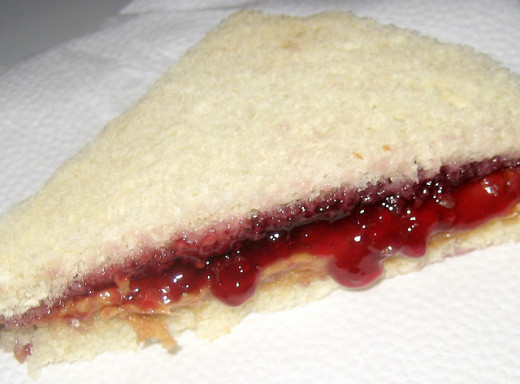6 New College Tips on Academics and Lifestyle

1. When Cooking, Love Your Freezer
If you like food, and everybody likes food, you'll find yourself wishing it weren't so hard to cook for one person. The solution is simple. Stop cooking for one person. Most recipes are built to feed a small family. The next time you make a meal, eat your fill and then split the leftovers into meal sized portions. Freeze them in ziplock bags or tupperware. You will only have to do this a few times. (Suppose each meal makes 5 extra servings and you make 5 meals. Suddenly you have 25 homemade freezer meals). These are a real treat when you are tired of Mac and Cheese.
Try freezing half of your bread and cheese to keep them from going bad!
Exception: Potatoes tend to turn mashed after being frozen and microwaved. Everything else I've tried is a go, from soup to casserole to fried rice.

2: Sack Lunches
Remember how much you love that freezer? It's also great if you bring your own lunch. Sack lunches are a lot cheaper than the school cafeteria and can be eaten during class if you have a busy schedule. I make all my sandwiches for the week and freeze them in separate bags. At the suggestion of my dietician roommate, I also portion all my veggies into bags with whatever condiment I want. Before I run to campus each day I grab my sandwich and vegetables along with anything else I want. I never have to miss a lunch because I'm running late and my sandwich bread is perfectly fresh by the time lunch rolls around.
3: Bathroom Caddies
Sharing a bathroom with five other people can be a bit stressful when you all have eight AM class. My suggestion is to put everything you use to get ready in one box, from medication to hair gel. This way you don't have to reach around roommates or misplace anything. On crazy mornings you just pick up your box and get ready somewhere else in the apartment. It also makes vacations and moving easier. No check lists necessary. Just grab your box and you're set to go.

4: Utilize Resources
Most college campuses have labs to help you out with homework. Writing Labs, Math Labs, Chemistry Labs, they have the works. People are paid to hang out there and help anyone who comes in with a problem. Some people do all their homework there in the lab just in case they run into problems. Even though I'm an English Major, I visit the Writing Lab for every major paper just to get somebody to look over it before I turn it in. You're never too good to ask for help.
The internet has some great resources too. Khan Academy is a treasure for subjects such as Science, Math, and Economics. Use SparkNotes before you read a text or before you discuss it in class. You can also check your writing with the Hemingway App.
If you find yourself stressed, head down to your campus counselors. Your tuition pays for it, you might as well reap the benefits you pay for.

5: Meet With Your Professors
Your professors and TA's are paid to be in their offices in order to help you out. TA's are great if you are confused on a little point or you need help studying for a test. They tend to be less ambiguous and will often teach you exactly what is on the test.
Professors are great to go to if you aren't sure what to write about or to proofread your paper before you turn it in. (After all, they will be grading it). It is best to e-mail and set up a time, both to be polite and to ensure that nobody else cuts in on your time. Besides giving great advice, professors also will be more understanding if they see you worked hard on your paper. They may even extend deadlines if you show you will use the time wisely. If you know nothing, tell them so. You will never regret getting help from a professor.

6: Find a Note Taking System
You may not have needed notes in high school. You will as a college student. There is simply too much to remember.
Handwritten Notes: A study by Pam Mueller and Daniel Oppenheimer shows that students retain more when they write their notes by hand. One popular method is the Cornell Method. Main ideas go in the left margin, regular notes in the space to the right, and a summary goes at the bottom. Not only does it make notes easy to find and review, but it forces you to process what you are writing and turn it into something you understand. It is also easier to make diagrams if you are a visual learner.
Typed Notes: Because of the number of books students already carry, many choose to take their notes on their computer to save space and paper. You can take more notes more quickly, but this means you also have more to sift through when you study. Make a system so you know what is what when you return to your notes. For my classes, I bold anything that the professor has written down, italicize anything that is solely my own opinion or idea, and highlight anything the professor says will be on the test. This makes it easy to sort and I can do a search for specific ideas when I get stuck.
Bonus: The Joys of Being a Freshman
Everyone jokes about the freshmen, but there will be times when they miss it too. Being a freshman means that you have a valid excuse for getting lost and being late. Nobody will mind if you ask for directions when you are a freshman (seniors may get dirty looks). People just assume you know nothing, so they will do everything you ask. Just start your sentence with the phrase, "I'm sorry, I'm just a freshman and . . ." They'll get you a map, a password, even install the new software for you. Don't worry, after a few weeks you'll feel like you've been a college student forever.
Final tip: You never know everything. Enjoy it and ask lots of questions. Humility also goes a long way towards making good friends.








